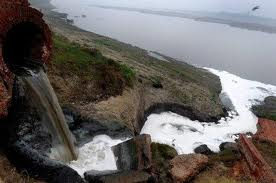
The project - which is planned to be completed by June 2021 - will incur a cost of Rs11.7 billion, in which the federal government will have a share of 33% while the share for the provincial government will be 67%.
Rs7.022tr budget for FY2019-20 sails through NA
The Karachi Water and Sewerage Board (KWSB) has prepared the final design of the plan, while its tendering process is underway. The installation of the sewerage lines will begin in July 2019 and the construction work of the two combined effluent treatment plants will begin in August.
Talking to The Express Tribune, the director of the project Zaheer Abbas - who retired on June 14 - said that the Executive Committee of National Economic Council (ECNEC) granted the approval for CETP last year, in which the federal government has a share of Rs3.8 billion, while the share for the provincial government stands at Rs7.9 billion.
This is one of those mega projects in which the federal and provincial governments are taking keen interest, while the Supreme Court has also issued special directives to complete the project in the earliest possible manner.
Abbas added that five combined effluent treatment plants under the KWSB will be built in various industrial zones to treat the industrial waste. CETP-I will be built in SITE area for the Phase-I SITE industrial zone, which will have a capacity to treat 19 million gallons of waste water.
Similarly, CETP-II will be built in Trans-Lyari area which will treat 27 million gallons of sewerage waste on a daily basis. CETP-III will be built for Federal B Area and North Karachi industrial zones, while CETP-IV will be built for Landhi and Korangi industrial areas, which will have a capacity of treating 26 million gallons of water on a daily basis.
Likewise, a CETP-V - with a capacity of treating 10 million gallons of waste water per day - will be built on Super Highway for the SITE industrial zone. That apart, there are plans to increase its water treatment capacity by 10 MGD in Phase-II.
Tenders have been opened for constructing the interceptors and installing sewerage lines at three locations, including Korangi, SITE and Mauripur.
The requisite technical documents for the project have been scrutinised while financial documents are still under review. Soon after awarding the tender, the construction work will begin.
Tenders will also be sought for the construction of the interceptors and installation of the sewerage lines in Gulshan-e-Maymar, Federal B Area and North Karachi zones in near future.
According to Abbas, two Combined Effluent Treatment Plants (CETP) will be built in Mauripur and Korangi for which tenders have already been invited and will be opened on June 25. The construction work on these locations will begin in August.
Mayor decries budget cuts as KMC presents Rs26.4b budget
Later, tenders for setting up CEPT in three industrial zones will be sought. He added that after receiving the work order, the respective construction company will have to complete the project within 18 months.
Abbas further explained that for the first time, these plants are being set up in Karachi for treating the industrial waste at government level. Earlier, the domestic sewerage treated through the treatment plants operating under KWSB were dumped into the sea, while the plants were incapable of treating the industrial waste. These domestic sewerage treatment plants also became non-functional a decade ago. The completion of this project will not only protect marine life but also reduce environmental pollution.

















COMMENTS
Comments are moderated and generally will be posted if they are on-topic and not abusive.
For more information, please see our Comments FAQ